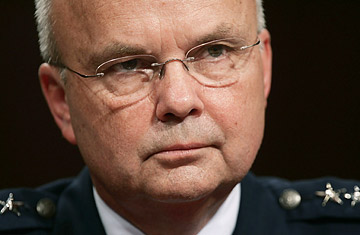
CIA Director Michael Hayden
This week's uproar over the destruction of interrogation tapes by the CIA offers a rare public glimpse into a perennial battle within the agency's clandestine service. Since Watergate, the CIA's case officers have been restrained by the expectation that taking risks in pursuit of actionable intelligence would bring career-ending, or even life-threatening, exposure if things went badly and details came to light. CIA leaders, especially after 9/11, have sought to unshackle their operatives by reassuring case officers they would be protected if they took risks. Current CIA director Gen. Michael Hayden said Thursday that the tapes of the questioning of al-Qaeda suspects were destroyed to protect the identities of the interrogators.
Indeed, the man who ordered the tapes destroyed is certainly familiar with the case that agency employees view as one of the worst political betrayals of an operative. Jose Rodriguez headed the National Clandestine Service when he ordered the interrogation tapes destroyed. But during the 1980s and 1990s he was a case officer in Latin America and in the CIA headquarters office that oversees operations there. He served under Terry Ward, the onetime director of Latin American operations who was fired in 1995 by then-CIA director John Deutch. President Bill Clinton's foreign intelligence advisory board had found Ward "derelict" in his duties for failing to inform Congress of human rights violations by agents of the CIA in Guatemala, including complicity in the death of an American citizen.
Ward's firing created a legacy of distrust at the agency. "There's the perception there that the politicians want you to be risk-takers, but as soon as you do and something turns out badly, they moonwalk away from you faster than a speeding bullet," says a former senior intelligence official who knows Rodriguez. CIA officers erupted in bitter laughter during a speech after the Ward firing in which Deutch urged them to take risks. Deutch's successor, George Tenet, attempted to mollify case officers by awarding Ward the Distinguished Career Intelligence Medal in March 2000.
But the fear of betrayal persists, and even after 9/11, CIA officers remain skittish. Case officers typically buy liability insurance to pay for lawyers in case their activities come to light. And concern about crossing a legal line on interrogation has been heightened with recent exposure given to cases of alleged torture. "Enhanced interrogation techniques are an example where people within the Administration, senior people, were fully briefed and oversight committees were briefed," the former senior intelligence official says. "At the time they were briefed, people on the Hill said things like, 'Are you sure you're doing enough?' And then information leaks to the media and suddenly the same people are saying, 'You're doing what?!' "
Now, Rodriguez's eagerness to protect his case officers has landed him, and others at the CIA, in serious trouble. Democratic Senator Dick Durbin called Friday for Attorney General Michael Mukasey to initiate an investigation into whether actions by Rodriguez or others criminally obstructed justice. Durbin argues, in his letter to Mukasey, that by refusing to turn the interrogation tapes over to the 9/11 Commission, CIA officials may have violated the law against criminal obstruction. Durbin has given Mukasey until Dec. 12 to respond.
The CIA, meanwhile, is scrambling to defend itself against the accusation of obstruction. "The agency went to great lengths to meet the requests of the 9/11 Commission," says CIA spokesman Paul Gimigliano. "The Commission had access to material from detainees... [and] even though the Commission obviously had a good sense of what was learned from detainees, the tapes were not destroyed while the Commission was active because it was thought the staff could ask about tapes at some point. As Director Hayden noted in his message to the CIA workforce, the tapes were destroyed only when it was determined they were no longer of intelligence value and not relevant to any internal, legislative, or judicial inquiries."
The irony may be that Rodriguez could have made matters worse, rather than better, for the clandestine service by destroying the tapes. A former senior Administration official says that the enhanced interrogation techniques used by the case officers had been approved by top lawyers and officials at the Justice Department and the White House, including then-National Security Advisor Condoleezza Rice and then-Attorney General John Ashcroft. Even if the techniques were in violation of the domestic and international prohibitions on torture, it would have been very hard for the powers at the White House, CIA and Justice to "moonwalk" away from the techniques if and when they were exposed.
The CIA insists that the destruction of the tapes was designed only to protect the interrogators from personal danger if their faces were made public with the leaking of the tapes. But there, too, the destruction may have made matters worse. If Mukasey decides to pursue a criminal obstruction of justice investigation, that could raise the risk of precisely the sort of exposure the CIA interrogators would prefer to avoid.
